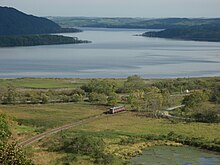Kushiro Wetland
Kushiro-shitsugen (Kushiro Wetlands or Kushiro Swamp or Marshland) covers an area of 268.61 square kilometres (103.71 sq mi) on the Kushiro Plain (Kushiro-heiya) and contains the largest tracts of reedbeds in Japan. The Kushiro River (154 kilometres (96 mi)), which originates in Lake Kussharo, meanders through much of the park. During the Ramsar Convention of 1980, in which Japan participated, the park was first registered as a peatland with raised bogs. In 1967, the wetlands (shitsugen) themselves had been designated as a national natural monument. For that reason, access is strictly limited and the landscape, most typical of Hokkaido, has been preserved.
The area was the setting for the 2014 Studio Ghibli film When Marnie Was There.

Wildlife
The vegetation of the park consists of reeds, sedges, peat moss wetlands, black alder thickets. The rivers which bend freely back and forth, groups of lakes and marshes, and other wet ecosystems comprise a varied environment. Kushiro-shitsugen is home to over 600 species of plants. The park is a valuable haven for wild species such as the red-crowned crane (Grus japonensis), huchen (Hucho perryi), Siberian salamander (Salamandrella keyserlingii) and dragonfly (Leucorrhinia intermedia ijimai).
Geography
Related cities, towns, and villages
See also
References
- ^ "Kushiro-shitsugen". Ramsar Sites Information Service. Retrieved 25 April 2018.
- ^ Imidas Atlas of Japan, Shueisha
- ^ Teikoku's Complete Atlas of Japan, ISBN 4-8071-0004-1
- ^ "Kushiro Shitsugen National Park". Encyclopedia of Japan. Tokyo: Shogakukan. 2012. OCLC 56431036. Archived from the original on 2007-08-25. Retrieved 2012-06-14.
- ^ "釧路湿原国立公園" [Kushiro Shitsugen National Park]. Dijitaru daijisen (in Japanese). Tokyo: Shogakukan. 2012. OCLC 56431036. Archived from the original on 2007-08-25. Retrieved 2012-06-18.
- ^ Kenkyusha's New Japanese-English Dictionary, ISBN 4-7674-2015-6
- ^ "Kushirogawa". Encyclopedia of Japan. Tokyo: Shogakukan. 2012. OCLC 56431036. Archived from the original on 2007-08-25. Retrieved 2012-06-20.
External links
- (in English) Kushiroshitsugen National Park - National Parks of Japan
- (in Japanese) Kushiroshitsugen National Park - National Parks of Japan
- J-IBIS
- Nature Restoration Project
- Ramsar
